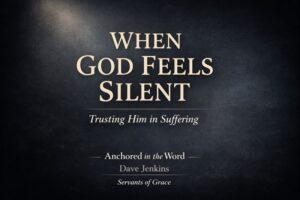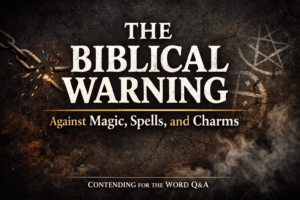⏱️ Estimated Reading Time: 19 min read
As a Calvinist, I can’t help but cringe whenever fellow Calvinists declare that humans do not have free will. While not always the case, the lecture that follows is often dominated by a tone dripping with intellectual snobbery, revealing the belief that being enlightened to the truth about the bondage of the will is evidence of spiritual and intellectual maturity. Those discussions are also often little more than a series of thinly developed assertions undergirded by the laissez-faire use of undefined terms. As a result, the discussions/arguments are rarely productive and serve to help create a rhetorical minefield out of what should be wonderful, faith-affirming, God-glorifying conversations about the doctrines of grace.
For the sake of full disclosure, about ten years ago, I hosted a group of friends at my house with the stated purpose of debating free will. Or, rather, I invited them over to lecture them about how humans do not have free will. Predictably, it was a disaster. Nerves were touched, tempers were lost, and very little of value was accomplished apart from enjoying the spread of Mediterranean food provided by one of the guests. Apparently, though, I failed to learn my lesson because I’m doing something that I’ve considered yet avoided doing for a few years: Writing an article about free will; specifically, and contradicting myself from ten years ago, my belief that the Bible affirms that humans have free will.
By God’s grace, my prayer is that my current attempt at taking on the topic of free will is characterized by far more humility than it has been in the past. Similarly, my objective with this article isn’t to win a debate nor to provide anyone with talking points to help them win debates. My main objective is to help us see ourselves in light of God’s Holiness and Glory while being thankful for His great mercy offered in salvation through grace by faith in Christ. Secondarily, I hope to encourage fellow Believers to desire and pursue nuance, humility, and graciousness when discussing the problem of free will. Thirdly, and in all honesty, I do desire to defend my belief that the Bible affirms that humans have free will because doing so helps point us to my main objective of glorifying God as well as requiring me to model my second objective.
So, with my stalling out of the way, time to take a deep breath and jump in: The Bible clearly teaches that humans have free will.
God’s Word also teaches our Creator’s sovereignty over all things. An apparent tension exists between those two things, of course. It should be pointed out, though, that the apparent tension is most often generated by humans striving to unlock the mysteries of God.
That’s not to imply that every attempt at interacting with hard theological questions is an example of meddling with things above our paygrade. The Bible also commands us to love God with our entire being, including our mind. Yes, true knowledge of God is relationally provided and mediated by the Holy Spirit through repentance of sins and faith in Jesus. But true knowledge will also produce the growing desire to learn more about our Creator and His eternal plan to redeem His people back to Himself; and not just learning in the relational sense but in the cognitive sense, too.
So, while there are points where we should simply submit to the reality that we are not God, meaning that there are many things that we will never understand about God the way God understands Himself, it is not inappropriate to attempt to love God with our mind through our humble and charitable exploration of things like the apparent tension between God’s sovereignty and humanity’s freedom. In fact, when humility and charity are present it is often beyond merely appropriate and can be edifying and a means of grace by which the Holy Spirit continues to build our faith and conform us to the image of the Son. It can also serve to provide interesting discussion topics at the local coffee shop – charitable discussions characterized by humility, of course.
Unfortunately, discussions about free will are often undermined from the get-go by the failure to define terms; specifically, two terms – free and will. So, we must ask, what is free will?
With the goal of laying a base-line for how complex that question can be, and with no plan to flesh out this paragraph, the free will debate includes competing definitions found in Compatibilism, Incompatibilism, Libertarianism (not related to the political theory), Reactive Attitude Theories, Hard Determinists, New Compatibilists, and even a theory called Principles of Alternative Possibilities, to name a few. Studying the history and current models/theories of free will is a deep dive, for those who are interested. If you are interested, the Fundamentals of Philosophy Series published A Contemporary Introduction to Free Will in 2005. Advances in the various arguments have been made since the publication of Dr. Robert Kane’s book, but I believe that it is a helpful introduction for those interested in delving into the fascinating philosophical debates over free will. However, I paraded the names of those competing theories across the page with the goal of helping us see that it’s essential to push the pause button on declaring there is no free will to our non-reformed friends until we have a clear understanding ourselves of what we mean by the concept of free will. Going a step further, I believe that doing so – fleshing out a definition – will reveal that we, and speaking to my Reformed brothers and sisters, do believe that humans have free will.
For the sake of brevity, and as I’ve already alluded, I’m going to circumvent the really hard work of breaking down all the different theories, exposing their strengths, weaknesses, and failures, and go straight to defining free will. I will then attempt to demonstrate why I believe that definition matches the data found in the Bible.
For me, the heart of the matter lies in the words of Jonathan Edwards who wrote in Freedom of the Will, “A man never, in any instance, wills any thing contrary to his desires, or desires any thing contrary to his will.”[1]
Think of it this way:
If after dinner, I offered you the choice of a piece of chocolate cake or strawberry pie for dessert, you would choose the option that you desire. Probably not requiring a whole lot of time, your brain would quickly filter through all the variables associated with choosing either cake or pie, weighing the pro’s and con’s of each, arriving at a decision. Even though you had complete freedom to choose either dessert option, for you to have chosen differently, a variable would’ve had to have been altered. In philosophical terms, you made the necessary choice.
The 19th-century German philosopher Arthur Schopenhauer helpfully explained, “necessary is that which follows from a given sufficient ground.”[2] In laymen’s terms, Schopenhauer is expressing what is described as the “same past, same present/future” dilemma. The dilemma inherent in the statement is that to have a different present/future, the past must be different, too. The same past can never lead to a different present/future. The classic 1980’s movie Back to the Future demonstrates this in an entertaining and helpful way.
For those who have watched the film, you’ll remember that after Marty McFly was plopped into 1955, Doc Brown warned him to avoid his parents at all cost. Failing to do so would “destroy the space-time continuum.” With that bit of sci-fi jargon, Doc was alluding to the “same past, same present/future” axiom. The movie bears this out with the photo from 1985 that Marty carries with him into the past.
In that photo, Marty stands with his brother and sister. As he continues to fumble and bumble his way through 1955, interacting at various points with his high school-aged mom and dad, the images of his brother and sister begin disappearing. Eventually, the image of Marty himself starts to be erased from the photo until the climactic moment when his mom and dad share their first kiss. The images are restored, and Marty introduces metal guitar riffs to the rock-a-billy and du-wap crowd dancing at the 1955 prom. However, upon his safe return to 1985, Marty discovers that even though the photo was restored, many other things had changed – among other changes, the Toyota pickup truck he coveted prior to his jaunt into the past was sitting in his driveway, and his parents were no longer losers but were respected and well-off. By interacting with his parents when they were teenagers, Marty had indeed destroyed, “the space-time continuum,” albeit for the better (or so he thought, until Back to the Future II, that is).
Marty had changed the past, which meant, by necessity, that the present/future had changed, too.[3]
Back to the Future is a fun and, frankly, good way to confront ourselves with how “same past, same present/future” works. With that in mind, will is the agency of our desires and choices, and it doesn’t exist in a vacuum.
However, we’ve only partially arrived at my definition of free will. Because, no doubt, many readers are already composing comments pointing out that most of what I’ve written up to this point demonstrates that humans do not have free will. At best, some of those comments will say, I’ve presented a pop-culture laced argument for Edward’s Compatibilism. To that, I have two things to say: 1. While aware that at first blush, I have presented an argument against free will, there is a pedagogical reason for why I am writing in the manner and order that I am. 2. Those who believe that I’ve demonstrated that humans don’t have free will have either never considered how they define “freedom,” or they have an over-realized definition of it.
Regarding the first thing, it’s essential to keep in mind that when Jonathan Edwards penned Freedom of the Will, his philosophical adversaries like Dr. Whitby subscribed to a form of libertarianism that essentially posits a definition that turns the human will into an unmoved mover. And that grand label is only deserved and owned by One.
The libertarian definition of the human will elevates humans to a position that only God deserves. It’s an anthropological Tower of Babel; Edwards was dismantling that Tower. His terms stood in contrast to the terms of his debate “partners.” We have different debate partners in the 21st century, not to mention that most of us are debating our friends and family, not theological luminaries. Accepting his Compatibilism doesn’t require facing the same debate partners as Edwards. Hence, our understanding and use of terms aren’t always going to be completely parallel with that of 19th-century philosophers and theologians, including those of Jonathan Edwards.
Four centuries later, very few legitimate philosophers or theologians accept, much less teach, the libertarian definition of the human will. It’s been demonstrated by both secular thinkers and theologians to be nonsensical and, ironically, the enemy of freedom. Next to no one believes that the human will is an unmoved mover. Even our non-Calvinist friends and family members do not believe in a libertarian free will, even if, like many Calvinists, they’ve never actually considered it.
Most of us have never thought about free will at a level deep enough to compel us to interact with the many sources available on the subject, much less know all the competing terms and definitions. Whenever someone posts a meme pointing out how humans don’t have free will, our family and friends don’t understand that the meme is interacting with a straw man that Edwards and others burned up a long time ago. They don’t know that the meme’s opponent holds a position that they don’t because memes don’t define terms nor provide historical and philosophical context (sadly, this is often true of face-to-face arguments about free will, too). Because of that, our non-Calvinist friends and family automatically, and understandably, assume the default position that humans have free will. Owing to the lack of intellectual integrity (most often unintentionally) on the anti-free will side, the put-upon non-Calvinists end up defending a position they next to no one, including themselves, actually agrees with because terms were never established, to begin with.
Here’s my pedagogical point: Fellow Calvinists, we’re not arguing with Dr. Whitby. We’re not arguing with Erasmus. We’re not arguing with Pelagians. We’re not arguing with hardened libertarians bent on defending a definition of the human will that attempts to steal God’s glory. We’re dialoguing with people who were created with an innate and correct sense of human freedom and responsibility in their heart. And affirming that humans have free will is not a threat to the doctrines of grace so gloriously taught in the Holy Scriptures.
And that brings me to the second thing I pointed out above. Those who nodded along in agreement as I defended Edwards’ statement about the will choosing what it finds most advantageous yet who resist my claim that humans have free will have an over-realized definition of freedom. Or, they’ve never defined it, to begin with.
As we define freedom, it will probably be helpful to hear from R.C. Sproul on the matter. According to the late reformed theologian, “The antithesis to divine sovereignty is not human freedom, but human autonomy.”[4]
In that quote, there is a more than a shade of refutation of libertarianism. And hammering home an earlier point, we’re not debating adherents of Pelagianism. In fact, using freedom as a synonym for autonomy, we run the risk of actually being the stumbling block that encourages people to drift closer and closer to Pelagianism. This means that a good definition of freedom will not include a reference to autonomy.
As he does throughout his short book, Schopenhauer distills it down to the simple yet profound statement, “’ free’ means ‘in conformity with one’s own will.’”[5]
Thinking about speed limits can help us make sense of the marriage of Schopenhauer’s statement to Edwards’ well-known teaching that the human will, will always choose what it finds most advantageous at the moment.
I love to drive fast. Far faster than our government (and science) has deemed as safe. However, other variables have been introduced that have helped shape what my will believes is most advantageous. Because not only do I desire to drive fast, I also desire to avoid speeding tickets and seeing my insurance rate go up. I have also read studies about what happens to the human body in high-speed crashes. So, while some would say that the physical restraints (the law) mean that I am not free, they are wrong.
My will is not autonomous; it’s not outside of the scope of external variables that shape and guide it (thankfully). But my will is free to choose what it finds most advantageous regarding the speed at which I drive my car. “My will is in conformity with itself,” to borrow again from Schopenhauer.
So, free will means that humans have the moral ability (freedom) to choose what they desire (will). The Biblical data supports that definition, as evidenced by the crucial theological question, what do you desire? And there are only two answers to that: You either desire Christ, or you desire yourself.
The theologically vital point to draw out of discussions about free will is that of desire. It’s been said that the only people who don’t get what they want are Christians. While that’s not true, because the Spirit changes the desires of the heart (thankfully), the overall point stands. Romans 3 teaches that humans are born with desires that run counter to submission to God. We don’t want God. We don’t want salvation from our sins because we desire our sins. And we are free to pursue our desires. We are free to rebel against God. All the way back in Deuteronomy 10, Moses recognizes that our free will is a problem.
After pleading with the Israelites to, “fear the Lord your God, to walk in all his ways, to love him, to serve the Lord your God with all your heart and with all your soul, and to keep the commandments and statutes of the Lord (Deut. 10:12-13), Moses adds, “Circumcise therefore the foreskin of your heart and be no longer stubborn (10:16).”
The problem, as Moses prophesied later in the book and as history bore out, the Israelites had neither the desire nor ability to “circumcise the foreskin” of their heart. The Old Testament tells the story of how God’s people whole-heartedly pursued the desires of their heart; desires that violated God’s law; desires that demonstrated that they did not love God. They were free to disregard the warnings of Moses and the subsequent prophets while fulfilling what they believed was most advantageous to them at the moment. Humans have free will, and it dooms them to living under God’s judgment. Thankfully, God provides a solution.
In Ezekiel 36:26-27, it’s revealed that we need a changed heart. In the words of the prophet, “[God] will remove the heart of stone from your flesh and give you a heart of flesh.”
God changes the will of His people, redirecting it towards Him for His glory. This is why David can promise in Psalm 37:4, “Delight yourself in the Lord, and he will give you the desires of your heart.” The will of the righteous is in accordance with God’s will. What the righteous finds most advantageous is what God declares most advantageous.
Circling back to Romans 3, and for the sake of repetition, humans have free will, and that’s the problem. Left to pursue his or her will, no human delights in the Lord. Quoting Psalm 14, Paul warns, “None is righteous, no, not one; no one understands; no one seeks for God (3:10-11).”
The Bible affirms that humans have free will. Humans are free to pursue their desired rebellion against God. And the fact that humans have free will is what makes the gospel of Jesus Christ such good news. Apart from the intervention of God, our free will dooms us all. However, God has promised to change the will of His people, giving us a heart of flesh in place of our heart of stone. God directs our will towards Him.
Thankfully, He does so, because the Bible teaches that each one of us will be held responsible for our choices. The free exercise of our will does not happen in a vacuum; actions have consequences. This is seen throughout both the Old and New Testaments. Adam and Eve’s free and willful decision to rebel against God resulted in their expulsion from the Garden, their eventual death, and the Curse that condemns all willful rebels against God to live and die under God’s wrath. On the heels of the sobering Genesis 3, Cain chooses to murder his brother because that’s what he found most advantageous at the moment. As a result, he was forced to wander the earth, an outcast. Throughout their nation’s history, the Israelites chose to turn away from the God who rescued them and worship false gods instead. The consequences were devastating.
We’ve all seen this play out in our own life or the lives of our family and friends, to one degree or another. A husband finds a woman who is not his wife desirable, pursues her, and commits adultery with her. The exercise of his free will won’t protect him from the consequence of a messy divorce. On a much less serious note, how many of us have freely chosen to enjoy pizza, steaks, and ice cream only to discover that our enjoyment doesn’t mean much when our expanding waistline causes us to need to buy a new wardrobe? On the most serious of notes, and continuing and building on the theme of the Old Testament, the New Testament warns us what will happen if we pursue the desires of our heart apart from Christ.
Paul points out in Romans 6:23 that, “the wages of sin is death.” There is a direct causal line from our willful rebellion against God to our eternal destruction. Same past, same future, right? Sin leads to death. Our free will doesn’t abrogate the consequences.
To change our future under God’s just and righteous wrath requires a change of our past (present). Left to our own devices, the natural man will always choose rebellion against God because that’s what our natural will finds most advantageous in the moment. We need our will changed and turned towards God. We need the variables altered.
Wrapped up in Dr. Sproul’s assessment that freedom is not synonymous with autonomy is the understanding that our choices place us under authority. The Bible declares that the only options are God’s wrath or God’s blessings. Unless the Holy Spirit intervenes, regenerates us, and gives us the gift of repentance of our sins and faith in the life, death, and resurrection of Jesus Christ our fate is sealed by our free will. The only way to change our fate, our future, is for the Holy Spirit to change our will from its natural state of rebellion against God to that of being in Christ.
Maybe instead of trying to convince fellow Believers that they don’t have free will, we should spend more time attempting to persuade fellow sinners that their free will is leading them to destruction unless God intervenes. Because the most important question isn’t whether or not we have free will, but what are the consequences for the exercise of our will? Having the mind of Christ dwell in us richly is a gift; a change of direction of our will that can only be accomplished by the work of the Spirit.
[1] Jonathan Edwards, Freedom of the Will (Vancouver: Eremitical Press, 2009), 11.
[2] Arthur Schopenhauer, Prize Essay on the Freedom of the Will (Cambridge, UK: Cambridge University Press, 1999), 6.
[3] I’m aware of the Block Universe Theory and other theories that purportedly refute “same past, same future.” I’m also aware of the answers to those objections. For the sake of space, I’ll trust the reader to look up those things if they are so inclined.
[4] R.C. Sproul, Willing to Believe: The Controversy Over Free Will (Grand Rapids, MI: Baker Books, 2008), 27.
[5] Schopenhauer, Prize Essay on the Freedom of the Will, 5.




